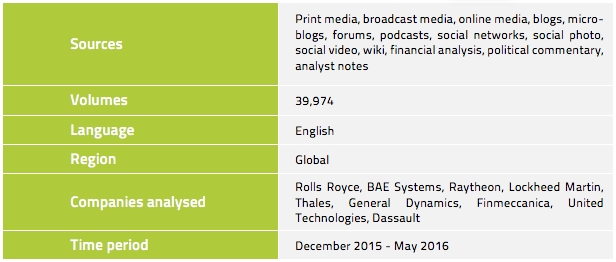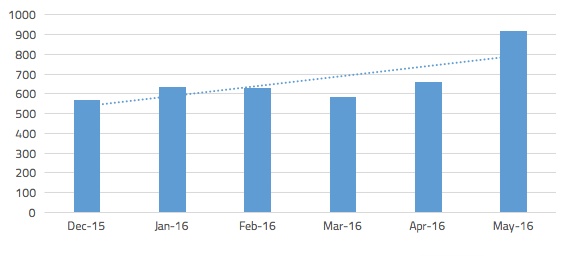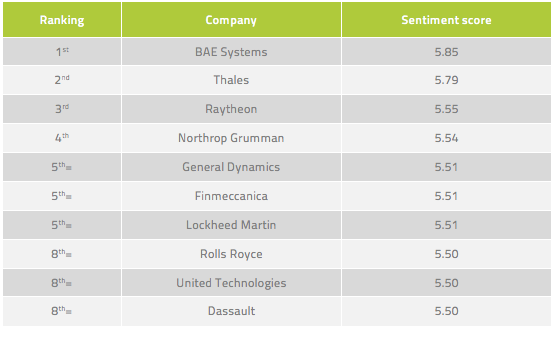Which are the top 3 companies for cyber security in the defence sector?
Over the past six months, alva’s analysis of the defence sector has seen an increase in competition among manufacturers positioning their organisations as focused on cyber security. In November 2015, Chancellor George Osborne announced the government’s policy of cyber investment, aiming at increasing the UK’s cyber capabilities as part of the UK Spending Review, whilst emphasising the Paris attacks and the international threats nations face.
Defence companies play a key role in this debate as they are the manufacturers who build cyber security technologies in order to meet governments’ and private companies’ goals to tackle threats.
In light of this apparent sector-wide positioning, alva used its comprehensive monitoring and analysis platform to investigate how this trend has developed and indeed which companies were leading the way in this domain and why.
Our analysis seeks to answer the following key questions:
- Is cyber security an increasingly important driver of brand sentiment and visibility for defence companies?
- Which are the top 3 companies for cyber security in the defence sector?
- Which messages are most effective and why?
The scope of our analysis is outlined in Figure I.
Figure I: Scope of analysis

Is cyber security an increasingly important driver of brand sentiment and visibility for defence companies?
Figure II: Average monthly mentions of cyber security in the defence sector
Figure II shows that over the past six months, coverage around cyber security has increased. Cyber security is at the centre of the general discussion around countries’ national security, and “keeping nations safe from terrorist attacks”.
This presents an opportunity for defence companies to bolster their corporate reputations by creating cyber security advancements which help governments protect their people.
Which are the top 3 companies for cyber security in the defence sector?
Looking in more detail at the companies tracked within the defence sector, it is clear that two organisations were particularly successful at generating positive sentiment on this issue, BAE Systems and Thales.
The graph below is an index of ten of the largest defence companies in the world, ranked in order of brand sentiment for the period December 2015 – May 2016.
Figure III: Defence sector index: Cyber security
Which messages are more important and why?
BAE Systems
BAE Systems topped the sector for cyber security for the period with coverage increasing 450% during March 2016. One of the main catalysts for positive brand sentiment was blog content published by BAE Systems, with its findings on the Bangladesh central bank cyber-attack, helping to increase third party engagement around the issue. Moreover, the company received extensive positive coverage from international media sources emphasising how its cyber security solutions safeguard the global financial system.
Thales
Thales ranked second in terms of sentiment for cyber security despite ranking fourth in terms of overall visibility. The company received positive sentiment in both trade and social media which represented 24% and 7% of its overall coverage respectively. Messages around the company investing in cyber security solutions to tackle increasing cyber-crime in the Middle East boosted Thales’ sentiment. A significant driver of brand sentiment was the company receiving an external Common Criteria Evaluation Assurance Level certification for its cryptographic technologies.
Raytheon
Raytheon ranked third whilst also generating the highest visibility. Communications focused around partnerships and sponsorships as Raytheon partnered with regional entities, including the Khalifa University, to tackle the increasing issue of cyber-crime in the UAE. The company also emphasised its plan to launch a Cyber Academy to help create the next generation of cybersecurity talent. Positivity increased due to messages around Raytheon awarding Women’s Cyber Security Scholarships, aimed at “giving them the opportunity to make an impact”.
Conclusions
The media content analysis clearly proves that cyber security is increasingly important for defence companies, both operationally and in their communications strategies.
The key takeaways from the analysis are:
- Blogging around cyber security generated positivity as it contributed to the debate around the issue whilst creating transparency. Linking cyber security technologies via blog sources to global challenges, including the protection of the financial system proved to be the key element for positive sentiment.
- Linking cyber security initiatives to governments’ objectives and general notions of global safety, especially in the Middle East which is at the centre of the global security discussion, could boost sentiment from key stakeholders, including the public and government.
- Publicising companies’ partnerships with Universities and their focus on women in cyber security proved to be an effective communications strategy, increasing positive sentiment for other issues in the defence sector, including skills.
End note
* The alva algorithm calculates sentiment scores out of 10, where a score of 5.50 is considered neutral. The algorithm takes into account the volume, influence, prominence and relevance of real-time mentions from 80,000+ news sources, more than 3m blogs and forums, 100+ social networks. A score above 6.00 is considered strong, while a score below 5.00 is considered weak.
Be part of the
Stakeholder Intelligence community









